|
Brought to you by Dairy's Professional Development Organization®
|
|
Opportunities to learn...

CREATING A MORE SUSTAINABLE, VIBRANT AND PRODUCTIVE WISCONSIN is the purpose of the Agricultural Community Engagement® (ACE) Education Seminar
Feb. 21, 2017 in Wisconsin Dells, Wis. You'll get the latest on upcoming regulations including high-capacity wells and updates on rural issues such as broadband access in non-urban areas. Attendees will also learn keys to building a sustainable dairy economy for the next generation and enhancing trust and transparency with consumers. Secretary of Agriculture, Trade and Consumer Protection Ben Brancel will open this meeting designed for local elected officials, dairy and livestock farmers, and all community and conservation leaders. For more details, full speaker line-up, and registration information
click here.
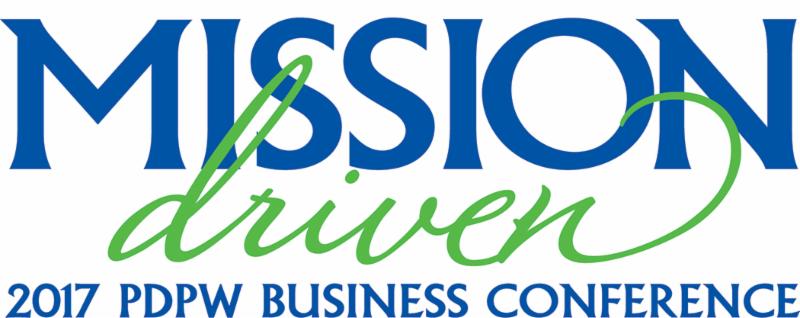
25TH BUSINESS CONFERENCE WILL BE AN EVENT TO REMEMBER.
Make plans today to attend the 25th PDPW Business Conference March 15-16. With 74 expert speakers and panelists, 4 keynote sessions, 25 breakout and specialty sessions, and more, you'll have access to the best resources, speakers and leading-edge information in one spot. Attend with a family or team member, so you can choose the perfect sessions to help you succeed. View the full
conference flyer
for details on speakers and sessions, and click
here
or call
800-947-7379 to register.
|
For your dairy...
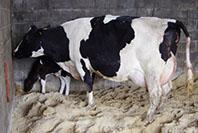 CAN INCREASING SEROTONIN LEVELS HELP PREVENT HYPOCALCEMIA
at the start of lactation in dairy cows? Research published in the Journal of Dairy Science studied how administering 5-HTP, a precursor to serotonin (5-HT) to cows beginning 10 days before expected calf birth and stopping the day of birth, would impact calcium levels in blood. Hypocalcemia is caused by the sudden increase in calcium demand dairy cows experience at the start of lactation, and serotonin is known to be a key factor in modulating calcium concentration in blood. In the study, serum calcium concentrations in both the treated and control groups dropped around the calf's birth; however, calcium remained higher in the 5-HTP group. Read the study abstract
. CAN INCREASING SEROTONIN LEVELS HELP PREVENT HYPOCALCEMIA
at the start of lactation in dairy cows? Research published in the Journal of Dairy Science studied how administering 5-HTP, a precursor to serotonin (5-HT) to cows beginning 10 days before expected calf birth and stopping the day of birth, would impact calcium levels in blood. Hypocalcemia is caused by the sudden increase in calcium demand dairy cows experience at the start of lactation, and serotonin is known to be a key factor in modulating calcium concentration in blood. In the study, serum calcium concentrations in both the treated and control groups dropped around the calf's birth; however, calcium remained higher in the 5-HTP group. Read the study abstract
.
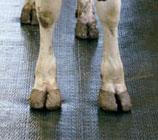 FOLLOWING STANDARD FOOTBATH PROTOCOL CAN DELIVER BENEFITS,
according to research conducted on nine farms. While footbaths are the most common approach to controlling digital dermatitis, there is a wide range in design and protocol. A study published in the Journal of Dairy Science sought to determine whether protocol recommended in scientific literature was effective. The protocol footbath design required an automated footbath that measured 3 m long, 0.25 m wide, and 0.15 m high, with a weekly footbath protocol using 5% CuSO4 for four consecutive milkings, replaced at a maximum of 200 cow passes. At the end of the research, the protocol footbath was effective on farms with high prevalence of active digital dermatitis lesions at baseline, but not on farms that already had low prevalence. The researchers concluded that following science-based recommendations on footbath practices are effective and that improving cow cleanliness would further result in control of active digital dermatitis lesions. See the full text of the research article
. FOLLOWING STANDARD FOOTBATH PROTOCOL CAN DELIVER BENEFITS,
according to research conducted on nine farms. While footbaths are the most common approach to controlling digital dermatitis, there is a wide range in design and protocol. A study published in the Journal of Dairy Science sought to determine whether protocol recommended in scientific literature was effective. The protocol footbath design required an automated footbath that measured 3 m long, 0.25 m wide, and 0.15 m high, with a weekly footbath protocol using 5% CuSO4 for four consecutive milkings, replaced at a maximum of 200 cow passes. At the end of the research, the protocol footbath was effective on farms with high prevalence of active digital dermatitis lesions at baseline, but not on farms that already had low prevalence. The researchers concluded that following science-based recommendations on footbath practices are effective and that improving cow cleanliness would further result in control of active digital dermatitis lesions. See the full text of the research article
.
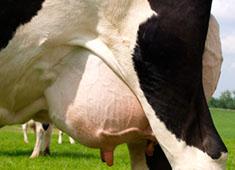 DO TEAT ANATOMY AND BEDDING TYPES AFFECT RISK OF INFECTION? A recent study published in the Journal of Dairy Science evaluated if there was an association between anatomical characteristics of teats with bacterial counts of teat skin of cows exposed to different types of bedding. Mainly primiparous Holstein cows were randomly allocated to four pens with a different type of bedding: new sand, recycled sand, deep-bedded manure solids, and shallow-bedded manure solids over foam core mattresses. Teat length, teat barrel diameter, and teat apex diameter were measured for each cow and teat skin swabs were systematically collected for microbiological analysis. No association was found between hyperkeratosis score and teat position and no association was found between hyperkeratosis score and teat skin bacterial count. Bacterial counts of teat skin swabs from front teats of cows in pens containing recycled sand and shallow-bedded manure solids over mattresses were significantly less than those of rear teats of cows in pens containing deep-bedded manure solids or new sand. Of all udder conformation traits evaluated, only narrower rear teat placement was positively associated with bacterial counts on teat skin. Click here to learn more. DO TEAT ANATOMY AND BEDDING TYPES AFFECT RISK OF INFECTION? A recent study published in the Journal of Dairy Science evaluated if there was an association between anatomical characteristics of teats with bacterial counts of teat skin of cows exposed to different types of bedding. Mainly primiparous Holstein cows were randomly allocated to four pens with a different type of bedding: new sand, recycled sand, deep-bedded manure solids, and shallow-bedded manure solids over foam core mattresses. Teat length, teat barrel diameter, and teat apex diameter were measured for each cow and teat skin swabs were systematically collected for microbiological analysis. No association was found between hyperkeratosis score and teat position and no association was found between hyperkeratosis score and teat skin bacterial count. Bacterial counts of teat skin swabs from front teats of cows in pens containing recycled sand and shallow-bedded manure solids over mattresses were significantly less than those of rear teats of cows in pens containing deep-bedded manure solids or new sand. Of all udder conformation traits evaluated, only narrower rear teat placement was positively associated with bacterial counts on teat skin. Click here to learn more.
|

CHECK WETLAND REQUIREMENTS BEFORE DIGGING DITCHES OR PLACING DRAIN TILE. Spring is around the corner and farmers who are considering maintenance projects such as constructing new ditches or installing drain tile are encouraged to check wetland requirements before proceeding with these projects. "DNR understands many farmers are looking to improve or expand the uses of their land," said David Hon, a DNR water regulation and zoning specialist. "We encourage farmers to work with DNR staff and use our convenient online resources to learn more before implementing costly capital improvements that may affect wetlands." About one-third of Wisconsin farms depend on constructed drains to remove excess water from fields, and in the past five years, Wisconsin Department of Natural Resources has seen a large increase in the number of proposals for projects related to ditching and drain tiling. For more information, do a search on the
DNR website for "wetland disturbance" or search the staff directory for your local water regulation and zoning specialist.
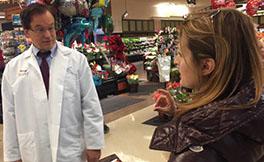 A NEW TREND IN MEDICINE IS BRINGING DOCTORS OUT OF CLINICS
a
nd into grocery stores, according to an article from National Public Radio. In California, several clinics are hosting "Shop With Your Doc" events where physicians are available to consult with shoppers making food choices in grocery store aisles. Doctors can make suggestions for healthier alternatives or cooking methods.
The "food-as-medicine" movement has been around for decades, but it's making inroads as physicians and medical institutions make food a formal part of treatment, rather than relying solely on medications.
Click here
to read more. A NEW TREND IN MEDICINE IS BRINGING DOCTORS OUT OF CLINICS
a
nd into grocery stores, according to an article from National Public Radio. In California, several clinics are hosting "Shop With Your Doc" events where physicians are available to consult with shoppers making food choices in grocery store aisles. Doctors can make suggestions for healthier alternatives or cooking methods.
The "food-as-medicine" movement has been around for decades, but it's making inroads as physicians and medical institutions make food a formal part of treatment, rather than relying solely on medications.
Click here
to read more.
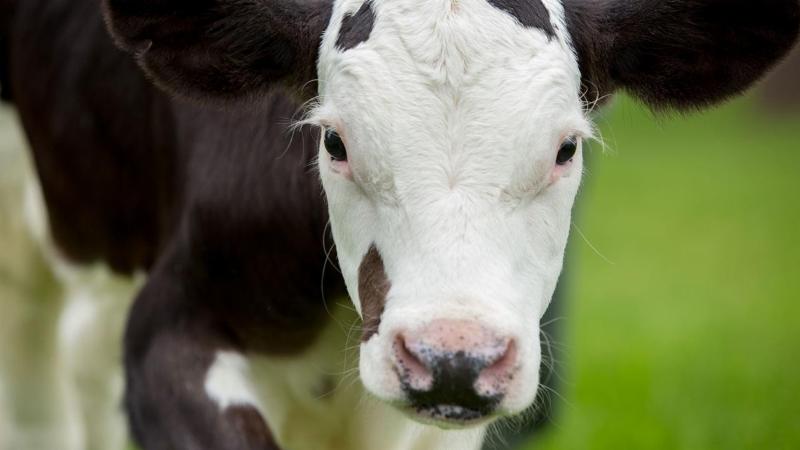 PROPOSED CHANGES TO BIOTECH RULES RAISE HOPES AND QUESTIONS from researchers and companies working on a variety of technologies. In January, the White House released an update to the Coordinated Framework for Regulation of Biotechnology, which divides up oversight and approvals between the USDA, FDA and EPA. The changes are being driven in part as new techniques like CRISPR gene editing are being adopted by the industry. A separate FDA draft guidance states that any intentional change to an animal's genes meets the definition of a "new animal drug," which could impact a number of animal products, such as the milk from cows genetically altered to be hornless. Learn more in the full article
from Science magazine. PROPOSED CHANGES TO BIOTECH RULES RAISE HOPES AND QUESTIONS from researchers and companies working on a variety of technologies. In January, the White House released an update to the Coordinated Framework for Regulation of Biotechnology, which divides up oversight and approvals between the USDA, FDA and EPA. The changes are being driven in part as new techniques like CRISPR gene editing are being adopted by the industry. A separate FDA draft guidance states that any intentional change to an animal's genes meets the definition of a "new animal drug," which could impact a number of animal products, such as the milk from cows genetically altered to be hornless. Learn more in the full article
from Science magazine.
|
For your business mind...
WHAT WILL SHAPE 2017 DAIRY EXPORTS? It
is no secret that dairy export markets are an important

driver for U.S. dairy markets and pricing. In their blog, US Dairy Export Council provided the top five indicators regarding what will shape export opportunities through the year:
1. European Union (EU) spring flush.
2. Demand headwinds, with product costs increasing and strong US dollar
3. High dairy stockpiles in the EU and US
4. US trade policy
5. China's product mix
Read details of each indicator and the full article on the US Dairy Export Council blog.

EVALUATE BUSINESS PLANS AS DAIRY ECONOMY CHANGES
.
Dairy farms and families have likely made changes to budgets and lifestyles to manage during challenging economic environments. As economics look to improve, Dr. Mike Gunderson, associate professor of Agricultural Economics at Purdue University, encourages
farmers to evaluate their business plans before returning to previous spending levels. "As margins improve, dairy farmers who continue to keep costs down and manage expenses will be able to build equity and savings that will allow them to explore growth opportunities in the future," he said.
Click here
for more information on farm business planning and strategies for managing expenses as well as evaluation growth opportunities.
 DON'T MISS OUT ON VITAMIN D DURING WINTER MONTHS. Vitamin D is essential to bone health and studies have suggested it could play a role in reducing the risk of cancer, heart disease, stroke, diabetes, autoimmune diseases and more. However, many people don't get enough Vitamin D because it's only found in a few foods and the sun is not a reliable source for everyone, especially during winter months. Mushrooms, eggs, cheese and beef liver contain small amounts of vitamin D, with most people getting their primary dietary sources of Vitamin D through fortified dairy products and cereals. Learn more about dietary requirements and options for getting more Vitamin D here. DON'T MISS OUT ON VITAMIN D DURING WINTER MONTHS. Vitamin D is essential to bone health and studies have suggested it could play a role in reducing the risk of cancer, heart disease, stroke, diabetes, autoimmune diseases and more. However, many people don't get enough Vitamin D because it's only found in a few foods and the sun is not a reliable source for everyone, especially during winter months. Mushrooms, eggs, cheese and beef liver contain small amounts of vitamin D, with most people getting their primary dietary sources of Vitamin D through fortified dairy products and cereals. Learn more about dietary requirements and options for getting more Vitamin D here.
|
"To succeed in your mission, you must have single-minded devotion to your goal." --- A. P. J. Abdul Kalam
|
Meet a fellow PDPW Member ... Brian Forrest
|
|
 |
| Brian Forrest |
 |
Brian Forrest, an owner at Maple Ridge Dairy in Stratford, Wisconsin, has relied on PDPW for information and ideas to improve his dairy and management skills since the early 1990s.
Brian was raised on a dairy farm, but after college, wasn't sure what his future held. He attended a PDPW seminar on cow comfort and sand bedding, then talked his dad into knocking concrete out of their stalls and changing bedding to see what would happen on their 130-cow dairy. Cows immediately filled up the new stalls and herd production performance increased. He was hooked on the idea of constantly improving, making adjustments and seeing good results.
"I just want to keep getting better, keep seeing how far we can go," said Brian. "That's the mindset I like about PDPW. They help farmers constantly improve performance across the farm."
In 2012, Brian had the opportunity to buy into Maple Ridge Dairy. After serious consideration, he decided to join the operation along with partners
Ken and Phil Hein. Together they raise 3,800 acres of mostly corn, beans and alfalfa, and manage and care for 1,800 Holsteins on two of their three sites. Thirty full-time
and four part-time employees work to keep things humming.
Recently, Brian put communications skills learned through PDPW programming to work at a new level. When Brian and his partners discovered that seven cows were missing from their dairy, he posted comments about it on Facebook, which generated more than 1,000 shares and likes and a call from a local television reporter. Having completed a PDPW media training program, Brian was much more confident in his abilities to handle the situation articulately.
"It used to be that I'd rather jump out of a burning building than be on camera," says Brian. "This situation was a case-in-point of how training to be on camera and learning about social media really paid dividends."
Within a few days, the sheriff's department received an anonymous tip identifying the location of their missing cows.
Brian continues to attend the PDPW Business Conference, Managers Academy, and ongoing programming and sends employees to various events. With experience on both 130-cow and 1,800-cow dairies, Brian attests to the value of membership regardless of dairy size.
"It's absolutely a great fit for you, wherever you are in your career. I attend different programs today than I did when I ran a smaller dairy. But there's a lot of great education for everyone," he said.
|
|
A BIG Thank You...
TO OUR PDPW SPONSORS who
support continuous improvement for the dairy industr
y.
T
hey believe in producer leadership and place a high value on lifelong
education for those involved in the dairy industry. We deeply respect their commitment to PDPW and the members we have the honor to serve. It is by this partnership that we c
ontinu
e to build a strong industry filled with capable professionals. Click
HERE
to see a list of our sponsors. If you interact with any of these companies, please thank them for supporting PDPW!
If you or a company you know is interested in participating as a sponsor, please contact one of our team members at [email protected] or call 800-947-7379.
|
|
PDPW Education Calendar
|
February 21
|
Agricultural Community Engagement Meeting: Wisconsin Dells, Wis.
|
March 14-15
|
Cornerstone Dairy Academy: Madison, Wis.
|
March 15-16
|
Business Conference: Madison, Wis.
|
April 6
|
Dairy's Visible Voice - Proactive Communication: Baraboo, Wis.
|
April 22-23
|
Youth Leadership Derby: Colby, Wis.
|
STAY CONNECTED
800-947-7379
|
|
|
|
|